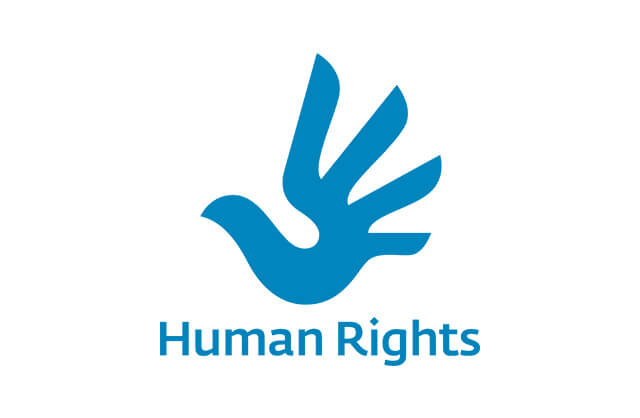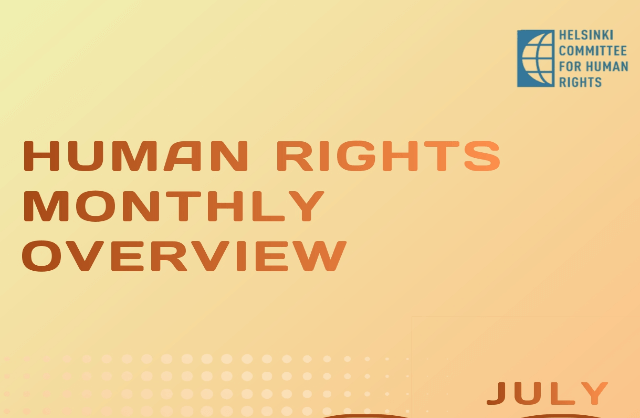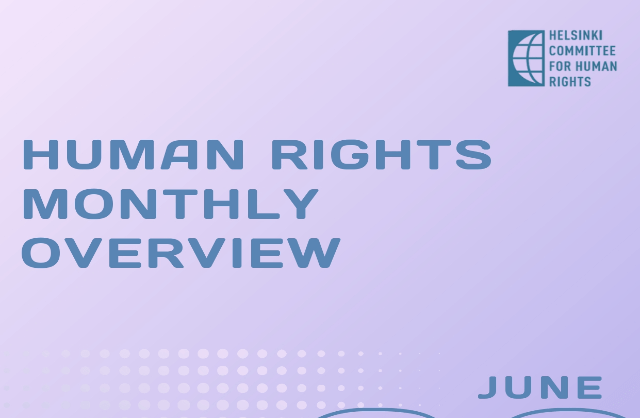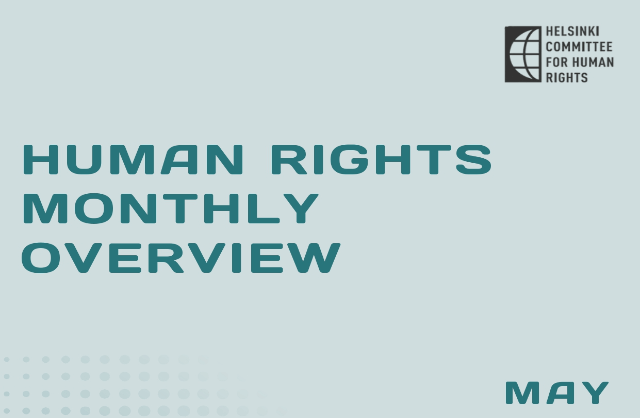Monthly Report (January 2011)
February 10, 2011

INTRODUCTION
Within the past month, the Helsinki committee worked on a certain number of cases where violations of human rights were detected in several segments and areas.
In addition to this Report, we have chosen several cases which deserve specific insight and analysis due to their nature and content, and in which the disregard of human rights was most emphasized.
Starting from the lack of possibility to locate the Commission for Protection against Discrimination, in the literal sense of the word, where the word non-transparency receives another meaning, via the latest Government campaign against abortion ”Choose life”, which endangers women’s reproductive rights and the right to choice in an explicit and unambiguous manner, to the absurdity of judicial labyrinths which not only deteriorate the citizens’ confidence in the judicial system, regardless of whether it is about the freedom of religion, as it is the case with the request on renaming the Orthodox Ohrid Archbishopric into Greek-Orthodox Ohrid Archbishopric of the Pec Patriarchy, whose members are left to seek protection of their rights before the Human Rights Court in Strasbourg, where they have already submitted their request with the Helsinki Committee as their representative, i.e. the marathon court procession of Slavcho Mitevski, who has been seeking his justice for 13 years and 4 months.
Another decision worthy of mentioning is the decision of the Constitutional Court to accept reviewing the initiative of the Helsinki Committee on assessment of the constitutionality of the disputed articles[1] from the Law on Construction.
PUBLIC EVENTS AND VIOLATIONS OF DEMOCRATIC PRINCIPLES
___________________________________________________________________
o Searching for the Commission for Protection against Discrimination
o The campaign “Choose life” – a hypocrisy of the state
o Law on Construction before the Constitutional Court
___________________________________________________________________
Searching for the Commission for Protection against Discrimination
The Commission for Protection against Discrimination, which should have started to operate on January 1st 2011, has not yet publicly stated where and when it shall start to operate.
Based on information received from the Ministry of Labor and Social Policy, representatives from the Helsinki Committee were directed to the building of the Macedonian Radio Television on January 27th 2011, but unfortunately, despite the persistent search, we received a response that the Commission for Protection against Discrimination is not located there, nor that they have information that it should be located there.
“So far we have received several complaints, but it is expected that the number shall rise abruptly”. This is a statement for the media given by Mr. Dushko Minovski, president of the Commission.
The question of how did people who allegedly submitted those complaints found the Commission in the first place remains unanswered, as well as what those people who yet want to submit complaints will do. Let us reiterate that the Law allows for a period of 3 months since committing the violation, to report it to the Commission. It is a deadline which is difficult to hold if the victim is not informed where to submit the complaint.
The Helsinki Committee, which monitors the implementation of the Law on Prevention and Protection against Discrimination, addressed the Ministry of Labor and Social Policy in written form on January 28th 2010, and asked for information on where the Commission is located, but we have not yet received a response.
Whether this represents the first step of boycotting the law or a subtle attempt to erase the existence of such a Commission from the collective memory, we are yet to see.
We demand urgent explanation of all necessary information regarding the Commission and we repeat that it is stipulated by the law with the aim to protect the victims, and not in favor of their additional victimization or ill-treatment.
The campaign “Choose life” – a hypocrisy of the state
The latest campaign of the Government of the Republic of Macedonia “Choose life” is a direct threat for women’s reproductive rights and the right to a choice, a phenomenon which we believed had been surpassed around 50 years ago. The propaganda materials which are on the brink of the ideological matrix of the current government, returned the spotlight over this disputable problem, which deserves deeper analyses, where words such as “violent” and “murder” are used with ease, regarding the discontinuance of pregnancy, not taking into account that by doing that, women are being stigmatized as “violent” and “murderers”, which once again promotes the stereotypes related to this discriminating, outdated and abandoned model of building social relations, as it is a direct opposite to democracy and the constitutionally guaranteed right to a choice.
Forcing this debate into the public once again is incomprehensible, having in mind the Fourth and Fifth Periodical Report on the Convention on Elimination of all forms of Discrimination Against Women (CEDAW) from 2010, in which the Ministry of Labor and Social Policy states: Considering the widespread use of abortion as a method of contraception and also due to the low rate of using modern contraception methods (9.8%) in 2008, the Public Health Institute, supported by UNFPA, created a Strategic Assessment of policies, programs and conditions in the country. This estimation confirmed the need of systematic and continuous engagement of all segments in society in order to improve the level of education and prevent unwanted pregnancy, as well as to increase the use of modern contraception methods. The Ministry of Health, supported by the United Nations Population Fund (UNFPA) formed a workgroup for creating a National Strategy for Sexual and Reproductive Health 2010-2020, supported by UNFPA.
That report also says that: Due to the need to standardize and enhance the quality of the abortion, the Ministry of Health, with the support of UNFPA, created the Standards of Quality and Care for Abortion in 2010.
Hence, with the campaign “Choose life”, it is unclear whether under “creating strategies for improving abortion”, the Government intended its full prohibition?!
However, the campaign got caught in its own web after the tragic event with the woman in detention due to the case “Pajazina” (“Spider web”), when, after her miscarriage, the state institutions denied their own responsibility with an incredible defense, which is completely opposite to their campaign and brought their hypocrisy into the light, but according to them, in this case, it was about a fetus, and the fetus is not a baby![2] And in such a turn of events, the public institutions involved in this situation did not find it necessary to distant themselves from the campaign, after which they give us an impression that they agree with it.
Consequently, there is an accent on the recommendation that, instead of taking measures which increase birth rate by force, via violating women’s basic rights, it would be better that the state dedicates itself more to seeking alternative ways to reduce the occurrence of unwanted pregnancy, especially via stimulating young marital couples in the area of family planning, ways of raising awareness in adolescent youngsters, educational programmes on sexual health, as well as the possibility to list contraception on the positive list of medication, which would make them more available, considering the poverty which is present in this country at a worrying degree.
In the context of the aforementioned, the Helsinki Committee salutes and supports the project of H.E.R.A. organization for the introduction of sexual education, as the most adequate model for increasing the knowledge of sexual life, as a prevention of unwanted pregnancy. Apart from this, sexual education shall introduce a new quality into the educational process, preparing youngsters for responsible sexual behavior and healthy life.
Once again we call upon the Government of the Republic of Macedonia, to work on the realization of human rights of its citizens, guaranteed by the Constitution, to create strategies for reducing poverty and improving the conditions for realization of the right to health and life, to start the implementation of already existing strategies and action plans, as well as accept the thoroughly elaborated initiatives by the non-governmental organizations, such as the one by H.E.R.A. for the introduction of sexual education, instead of defocusing the public with humiliating and discriminating campaigns.
Law on Construction before the Constitutional Court
The Law on Construction brought in 2009 stipulates that if a building has been built or has undergone additional building without an construction permit, and the person does not fulfill the obligation of removal or alignment of the building with the permit during the time period stipulated with the permit and/or does not pay the penalties for three consecutive months, the authoritative body shall approach toward forceful execution via acquiring ownership over the land and the building – the part which has been built with the construction permit.
Considering that this provision represents a direct violation of the provisions of the Constitution of the Republic of Macedonia and the European Human Rights Convention, ratified by the Republic of Macedonia, the Helsinki Committee submitted an initiative to the Constitutional Court of the Republic of Macedonia with which it demands that a decision is made for the abolishment of these provisions from the Law on Construction.
The Constitution of the Republic of Macedonia guarantees the right to property and stipulates that the property and rights deriving from it may not be limited or taken away from anyone, except in cases when it is a matter of public interest stipulated by law, and only and exceptionally in case of expropriation of property, while the expropriation performed guarantees compensation which may not be lower than the market value.
The right to property is also guaranteed with the European Human Rights Convention, which stipulates: “Every physical or legal entity has the right to enjoy unobstructedly in their own property. Nobody shall be deprived of their own property except in cases when it is a matter of public interest and under conditions stipulated by law and general principles of international law.”
The right to property may be taken away and confiscated only on the basis of a court decision, which determines committing a criminal act under conditions stipulated by the Criminal Code, which stipulates that “Property benefit shall be confiscated by a court decision which determines committing a crime under conditions stipulated by this Code.”
COURT CASES
___________________________________________________________________
o Freedom of religious belief – Macedonia via Strasbourg
(Case – Ohrid Orthodox Archbishopric )
o Trial within a reasonable time period – 13 years!!!
(Case – Slavcho Mitevski)
___________________________________________________________________
Freedom of religious belief – Macedonia via Strasbourg
The Helsinki Committee, within its mandate, continually follows the condition with practicing the right to religious belief in the Republic of Macedonia and has pointed out the problems citizens are facing on this matter, several times in its reports. The Committee pointed out several cases which represent a violation of the new Law on the legal position of churches, religious communities and religious groups, which should have been a starting point for practicing the right to a religious belief.
The Committee’s attitude toward the inadequate application of the law which generates a violation of the freedom of religious belief of the religious communities which want to register as such has been also supported in the EU reports on Macedonia’s progress and the State Department Report on religious freedom, as well as the report of the European Commission against racism and intolerance.
Unfortunately, the indications by the Committee and international organizations have obviously not been received by the judicial instances which continue the restrictive application of the law, making the registration of a large number of new religious communities impossible. This practice of the judicial organs continues to the Constitutional Court which decides on the requests for protection of the freedom of beliefs and religion.
Namely, representatives from the Ohrid Orthodox Archbishopric (OOA), since being denied their request for registration and under a new name as Greek-Orthodox Ohrid Archbishopric of the Pec Patriarchy, have submitted a request for protection of the freedom of belief and religion to the Constitutional Court.
However, even despite the obligation deriving from the Constitution of the Republic of Macedonia which stipulates that the Constitutional Court protects the freedom and rights of the citizens, regarding freedom of belief, conscience and thought when they have been violated with an individual act[3], the Constitutional Court decided that the process assumptions for making a decision upon this request have not been fulfilled, hence declared itself unauthorized for obligations deriving directly from the Constitution and do not regard the protection against discrimination and freedom of belief, especially in the attempt to register several religious communities, which once again proves that the state does not possess an efficient legal instrument available to the citizens when these rights are being violated.
Within the lack of possibility to realize their rights in the Republic of Macedonia through the institutions of the system, the representatives of the Greek-Orthodox Ohrid Archbishopric of the Pec Patriarchy are left to seek justice before the Human Rights Court in Strasbourg, where they have already submitted their request, supported by the Helsinki Committee as their legal representative.
The Helsinki Committee calls upon adequate implementation of the Law on the Legal Position of the Churches and other Religious Communities, so as to provide religious pluralism in the country, as well as upon the Constitutional Court, in order for it to recognize itself in the role of an efficient corrector in cases of violation of the freedom of religious belief, which would avoid court cases against Macedonia before the European Human Rights Court.
Trial within a reasonable time period – 13 years!!!
A specific form of inefficiency of the courts is their lack of care for implementing their own decisions. This situation is particularly worrying in a series of cases when the execution should be performed by the bodies and institutions of the state, however, neither they nor the courts feel any obligation to implement the courts’ decisions. The non-implementation of court decisions (whether it is a matter of final decisions or decisions of higher instance courts which should be implemented by the lower instance courts) means a several-years prolongation of the protection of a certain right, i.e. the implementation of a certain sanction. The problem has absurd proportions when it appears on a level of non-performance of the decisions of the Supreme Court of the Republic of Macedonia.
Slavko Mitevski started his battle for justice in 1997 when his working position in AD “Selena” Stip was terminated due to a bankruptcy procedure against the legal entity. He submitted a request to the Employment Agency in Stip in order for it to recognize the right to financial allowance due to unemployment, a right stipulated by the Law on Employment and Insurance in case of Unemployment. The Employment Agency granted him financial allowance during a period of 15 months, but according to the statements by the client, the calculation of the amount of the allowance and the time period had been irregularly determined, after which a complaint was filed.
Instead of the mistake to be corrected the second instance body – the Ministry of Labor and Social Policy, it was repeated by them as well, after which the client decided to ask for court protection in the Supreme Court (and further on in the Administrative Court) by commencing an administrative proceding.
The Supreme court of the R. M. determined the irregularity, thus rendered the decision of the Ministry of Labor and Social Policy invalid, and returned the case to another procession with concrete suggestions according to which the bodies were OBLIGED to act.
According to the logic of things, this story should end here. But…
The Employment Agency in Stip obstinately determined the same amount, and the Ministry of Labor and Social Policy confirmed that decision. The ignorant attitude of those two authoritative bodies is obvious, and they do not respect the directions given by the Courts.
So far, there have been 7 negative decisions for the client by the Employment Agency in Stip, 11 decisions by the Ministry of Labor and Social Policy (which confirm the decision of the Agency), 3 court decisions by the Supreme Court with which the decisions of the Ministry of Labor and Social Policy are rendered INVALID and the subject is returned to another procession and decision, 2 court decisions by the Administrative Court and 1 decision.
The question is, why didn’t the Administrative Court make a decision. It is authorized to decide on the matter independently, in case when the repeated procession before the authoritative bodies shall cause harm to the client, i.e. the administrative act has already been rendered invalid once, and the authoritative body did not implement the court decision.
Yet, the guilt definitely should not be sought only in the Employment Agency in Stip and the Ministry of Labor and Social Policy, because the Administrative Court as well did not find it sufficient that there was a large number of decisions contrary to their decisions and given opinions, after which leading this procession has become meaningless!
The Supreme Court of the Republic of Macedonia, while proceeding the client’s request for protection of the right to a trial in a reasonable time period, tries to correct the mistake with a symbolic compensation of the client for his long-term difficulties, but what is worrying is that it forgets to put a line by determining a period of time in which the authoritative bodies should make their decision.
The Helsinki Committee stresses the importance of not repeating such nebulous situations in the future, and not allowing the institutions with their nonchalant behavior to throw a shadow over the entire system!
——————————————————————————–
[1] The Helsinki Committee submitted an initiative to the Constitutional Court of the Republic of Macedonia in which it demands a Decision for abolishment of article 138 paragraphs 4, 5, 6, 7 and 8 of the Law on Construction, issued in the Official Gazette No. 130/2009 from October 28th 2009.
[2] “Dnevnik”, Friday, February 4th 2011., pages. 2 and 3
[3] Article 51 from the Rules of Procedure of the Constitutional Court.


